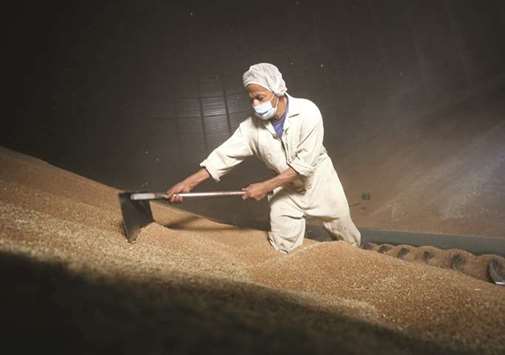Egypt’s latest wheat tender drew offers from the fewest companies in two months, as conflicting rulings over the world’s largest buyer’s ever-changing grain standards continued to confuse traders.
Six firms offered to sell wheat to the General Authority for Supply Commodities yesterday, two traders familiar with the matter said. That’s down from eight companies in the previous tender and is the fewest since mid-September, data compiled by Bloomberg show.
The offers come two days after a court ruling banned imports of wheat infected with ergot, a common type of fungus that’s toxic in high quantities. However, the agency that oversees inspections of grain cargoes said on Wednesday it will continue to follow international standards, which allow for trace amounts of ergot, unless the government issues a new decree stating otherwise.
The court’s decision adds to confusion for traders who sell wheat to Egypt. Different authorities in Egypt have issued conflicting rules for tolerance of the fungus, causing sporadic halts in imports to the most populous Arab nation. Casillo Commodities’ French unit said uncertainty over ergot rules was one of the reasons it wouldn’t participate in yesterday’s tender.
“Uncertainty surrounding the ergot specifications means a higher risk of traders incurring a costly rejection,” said Charles Clack, an analyst at Rabobank International in London. While that was somewhat reflected in the number of offers yesterday, prices “are still pretty low with no risk premium as such,” he said.
Egypt pays a premium of at least $50mn a year for wheat imports because of its “unpredictable” policy, according to a report from SovEcon in Moscow.
While tenders have been mostly proceeding normally this year, Egypt’s wheat imports have been disrupted for containing poppy seeds. The government stopped several cargoes earlier this year due to concern that they contained the seeds, which the country bans.
GASC, the state buyer, received offers of Russian wheat from five companies in yesterday’s tender, according to two traders who asked not to be identified because they’re not authorized to speak to the media. One firm, Cofco International Ltd, offered Romanian wheat, the traders said. The grain is for January 1-10 delivery.
Wheat cargoes that the authority contracted to buy in the past won’t be affected by the court decision, Ismail Gaber, head of the General Organization for Export and Import Control, the agency in charge of grain inspections, said on Wednesday.
Egypt’s Agriculture Ministry is waiting for instructions on whether the court ruling will change the inspection process, spokesman Hamed Abdel-Dayem said. “Until then, things remain the same, nothing changes,” Abdel-Dayem said.
The dispute dates back about two years, when the country said it had zero tolerance for the fungus and after local news reports fanned worries that ergot-tainted bread sold by state bakeries could cause ailments from kidney failure to miscarriages. When Egypt halted cargoes suspected of ergot contamination, traders responded by raising prices. It took a decree for the prime minister to resolve the standoff.
If the requirement for zero content of ergot is back, it’ll be a problem and make Russian exports slower,” said Arkady Zlochevsky, president of the Russian Grain Union.

A man collects wheat at the grain silos in Cairo. Different authorities in Egypt have issued conflicting rules for tolerance of the fungus, causing sporadic halts in imports to the most populous Arab nation.
